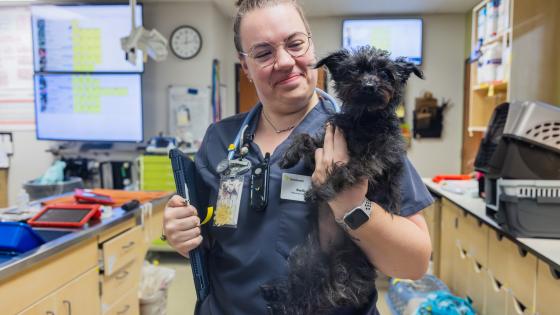
Pets and Chocolate: A Toxic Combination
Milk or dark, candy or cake – chocolate may be one of our favorite sweet treats, but it’s definitely not meant to be consumed by our furry friends.
“Chocolate is toxic and can be fatal to animals,” said Dr. Ladan Mohommad-Zadeh, a board-certified veterinary criticalist at DoveLewis. “Dogs are most at risk simply because they get into things they shouldn’t. Cats and other animals don’t typically have an interest in sweet foods but can still be at risk. The bottom line: If you suspect your pet has eaten chocolate in any amount, call DoveLewis or your regular veterinarian immediately.”
What are the dangers of chocolate?
Cacao beans, one of the main components of chocolate, contain theobromine, which is a chemical compound toxic to animals. Humans have the ability to break down theobromine quickly and naturally in the body, allowing us to enjoy the tasty dessert. Theobromine can last for up to 18 hours in a dog’s system, but symptoms of toxicity usually appear within 12 hours or less. Theobromine stimulates the central nervous system which increases heart rate and blood pressure.
What are the signs of chocolate poisoning?
- Excitement, nervousness and trembling
- Vomiting and diarrhea
- Excessive thirst and urination
- Muscle spasms and seizures
- Coma and death
Are some chocolates worse than others?
Chocolate with higher quantities of cacao are more dangerous. For example, unsweetened, dark and baking chocolates contain eight to ten times the amount of theobromine than milk or semi-sweet chocolate. White chocolate also contains theobromine but in such low quantities that toxicity is unlikely. Caffeine, which is also a common compound in chocolate, can also be dangerous to pets.
Does the size of my dog matter?
The size of the animal and the amount and type of chocolate ingested will dictate the severity of the reaction. However, in the event of an ingestion of any type or quantity, it is best to seek immediate medical advice.
Recent Posts
Top Winter Care Tips for Your Pets
When you normally think of weather safety with your pets, you may naturally think of leaving animals in hot cars during summer. But did you know that cold weather also poses a serious threat to your animal's wellbeing?



